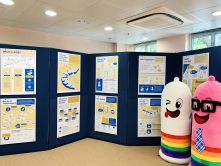Dialogue Script of Animation “Sexuality Animation Classroom – Testing & Treatment”
|
Super: HIV Testing Voice Over: When a person is infected by HIV, the body responds by producing antibodies. Voice Over: However, the protection of these antibodies is not strong enough. Voice Over: HIV antibody test detects the presence of such antibodies in blood or oral fluid. Voice Over: It can tell whether a person has been infected with HIV. Voice Over: If the test result is positive. It means that the person is HIV-infected. Voice Over: If the test is done after the window period and the result is negative, Super: it means that the person is not infected. Voice Over: Venous blood sampling is a conventional HIV test, it takes around 1 week for the result, Voice Over: whereas rapid tests, such as finger prick blood or oral fluid, only require 20 minutes. Voice Over: Rapid test is only a screening test, Voice Over: Any positive result Voice Over: should be followed by taking venous blood for confirmatory test Voice Over: conducted by a laboratory. Super: Window Period Voice Over: HIV antibodies take some time to develop in the human body before reaching a detectable level. Voice Over: The period between initial infection with HIV and when the antibody test shows a positive test result is called the window period. Voice Over: Subject to individual conditions, the window period can be up to three months. Voice Over: A negative result obtained during the window period cannot exclude HIV-infection Voice Over: as it may be due to insufficient level of antibodies to be detected. Voice Over: During this period, the virus replicates rapidly in the infected person, Voice Over: who becomes highly infectious Voice Over: and can transmit the virus to others even if a negative result is obtained Voice Over: Users should retest after the window period Voice Over: or consult a doctor whenever in doubt. Super: When Should I Have an HIV Test? Voice Over: Most HIV-infected persons are asymptomatic during the early phase of infection. Voice Over: If a person has been sexually active and has never been tested before, he or she should consider performing HIV testing Voice Over: If a person has multiple sex partners Voice Over: or persistent unsafe sexual behaviours Voice Over: He or she should perform HIV testing every 6-12 months regularly. Super: Antiretroviral Therapy Voice Over: Although there is as of yet no cure for HIV infection Voice Over: medications are available and effective in fighting HIV and its complications. Voice Over: Antiretroviral agents attack HIV at different stages of its life cycle to inhibit HIV replication. Voice Over: Effective antiretroviral therapy can reduce the number of viruses in human blood Voice Over: and increase the number of CD4 cells which helps maintain the immune system Voice Over: as well as contribute to fewer opportunistic infections and HIV-associated cancers. Voice Over: With the right way in taking the therapy Voice Over: for around or within six months, Voice Over: most of them could achieve undetectable viral load by standard laboratory tests. Voice Over: Evidence has shown that Voice Over: people with HIV who achieve sustained viral suppression Voice Over: to an undetectable level by antiretroviral drugs Voice Over: have no chance of passing on the virus through sex. Super: For more information, please visit: This link will open in a new windowhttps://www.hivtest.gov.hk
|













